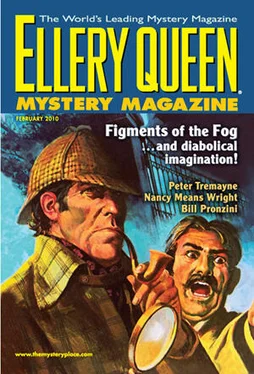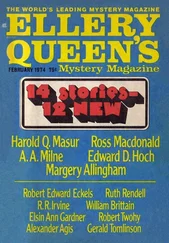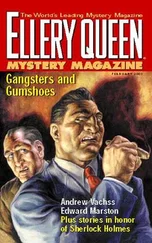Robert Barnard - Ellery Queen’s Mystery Magazine. Vol. 135, No. 2. Whole No. 822, February 2010
Здесь есть возможность читать онлайн «Robert Barnard - Ellery Queen’s Mystery Magazine. Vol. 135, No. 2. Whole No. 822, February 2010» весь текст электронной книги совершенно бесплатно (целиком полную версию без сокращений). В некоторых случаях можно слушать аудио, скачать через торрент в формате fb2 и присутствует краткое содержание. Город: New York, Год выпуска: 2010, Издательство: Dell Magazines, Жанр: Детектив, на английском языке. Описание произведения, (предисловие) а так же отзывы посетителей доступны на портале библиотеки ЛибКат.
- Название:Ellery Queen’s Mystery Magazine. Vol. 135, No. 2. Whole No. 822, February 2010
- Автор:
- Издательство:Dell Magazines
- Жанр:
- Год:2010
- Город:New York
- ISBN:нет данных
- Рейтинг книги:3 / 5. Голосов: 1
-
Избранное:Добавить в избранное
- Отзывы:
-
Ваша оценка:
- 60
- 1
- 2
- 3
- 4
- 5
Ellery Queen’s Mystery Magazine. Vol. 135, No. 2. Whole No. 822, February 2010: краткое содержание, описание и аннотация
Предлагаем к чтению аннотацию, описание, краткое содержание или предисловие (зависит от того, что написал сам автор книги «Ellery Queen’s Mystery Magazine. Vol. 135, No. 2. Whole No. 822, February 2010»). Если вы не нашли необходимую информацию о книге — напишите в комментариях, мы постараемся отыскать её.
Ellery Queen’s Mystery Magazine. Vol. 135, No. 2. Whole No. 822, February 2010 — читать онлайн бесплатно полную книгу (весь текст) целиком
Ниже представлен текст книги, разбитый по страницам. Система сохранения места последней прочитанной страницы, позволяет с удобством читать онлайн бесплатно книгу «Ellery Queen’s Mystery Magazine. Vol. 135, No. 2. Whole No. 822, February 2010», без необходимости каждый раз заново искать на чём Вы остановились. Поставьте закладку, и сможете в любой момент перейти на страницу, на которой закончили чтение.
Интервал:
Закладка:
The camera moves to the man’s troubled eyes, where tears start to brim. Then it pulls back to see the entire room. Pieces of the woman’s clothing are strewn about the bed and floor. The man snatches them up and sets about dressing her, while the unsteady camera stays with him. His eyes rove the bed, fixing on the necktie. He grabs it, wads it up, and shoves it deep into one of his pants pockets. Then he makes the sign of the cross, lifts the woman in his muscular arms, and carries her from the room, turning left.
The camera pulls back haphazardly, slipping out of focus. The footsteps quicken and stumble as they retrace their path across the patio. Through the kitchen window, the camera frames the man awkwardly as he kneels and sets the woman’s body gently on the floor. The shooter pushes in shakily, trying to focus, as the man arranges her legs and arms into ungainly positions. Her limbs appear stiff and the effort causes the man to swoon. He rises unsteadily, looking queasy, glistening with sweat. He staggers to the sink, splashes water on his face, gulps from the tap.
The lens suddenly points downward at flagstone, then at a stoop, then at linoleum as the shooter enters the house. The camera is set aside atop a washing machine and forgotten but its microphone continues recording: sneakers crunching broken glass, the dog barking outside, a man’s startled voice as footsteps stop in the kitchen.
“Nicky!”
Then a boy’s frightened voice, high and cracking: “What’s wrong with Mom?”
Nick Falco kept his camera on Deputy Ramirez as he climbed from the patrol car and approached the two corpses in the graffiti-scarred alley.
It was a grim scene, a boy and girl murdered execution-style. The boy was still on his knees, toppled sideways, shot once in the back of the head. The girl was sprawled faceup a few yards away, with blood on her chest. Both victims bore distinct tattoos. A gang deal, Nick figured. Two teenagers caught in the wrong neighborhood and gunned down for it. He panned from the deputy to the bodies and then back again. Always show the action from the cop’s POV — that was the mantra of Police in Action , one of the key reasons it was still on the air after twenty years.
Nick knew all the rules, all the tricks. After twelve years on the job, he thought, I’d better know what I’m doing. Because this isn’t just a job, documenting the horror of violent crime, cops chasing down bad guys.
It’s a mission, what I live for. It gets me through the day, keeps me sane.
He pushed in on Deputy Ramirez as he called in the double homicide to dispatch. It was July, a warm L.A. morning. Ramirez, who was on the stocky side, wiped his brow with his shirtsleeve. Behind Nick, the sound man did his dance, staying out of Nick’s way but keeping the boom overhead, without creating a shadow. Nick kept his camera moving, missing nothing. An average Police in Action segment lasted only six or seven minutes but it was pure cinéma vérité — no script, no narrator — so Nick had to give the editors plenty to work with. He grabbed as many extra shots as he could: patrol officers stringing yellow tape to cordon off the alley, uneasy residents peering over back fences, flies buzzing about the corpses before settling to crawl around the eyes and mouths. He knew the network might not approve a cutaway to the flies — too realistic for the eight p.m. time slot — but he got the shot anyway, for insurance.
It’s not for nothing that I’m known as one of the best shooters in the business. If that’s cocky, tough luck.
He heard a car roll up behind him and glanced back from the corner of his eye without losing the shot. A sheriff’s detective climbed from a spotless Crown Victoria. Sometimes they were in pairs, but this one was alone. She was a trim woman in her fifties, wearing a navy blue pants suit and flat shoes. Her graying hair was short-cropped, her bearing ramrod straight. Nick recognized her instantly: Katherine Forrest, rank of sergeant, twenty-eight years with the sheriff’s department, known for her no-nonsense manner and independent style. Nick knew she wasn’t keen on having a camera crew around, but she wouldn’t break his balls about it, either. As long as he and his sound man stayed out of her way and didn’t disturb evidence she tolerated them.
He swung his lens from Ramirez to Forrest as she approached. The deputy greeted her perfunctorily and filled her in on what he knew. As she moved on toward the bodies, she ignored Nick and his sound man as if they weren’t there.
Perfect. Keeps it real. Just the way we like it.
She slipped on latex gloves as she went, her keen eyes scanning the alley for more obvious evidence, like spent shell casings. If she noticed something, Nick had to spot it too, zooming in to maintain her POV. Sometimes he spotted it first, he was that good. He stayed close behind her, but not too close, careful not to interfere. That was another Police in Action rule, and it was inviolable.
She approached the dead girl first. Nick adjusted his lens, kept the detective in sharp relief, so smoothly viewers would barely notice he was shooting with a shoulder-mounted camera. When she knelt to examine the body without touching it, he pushed in for a tight shot of the victim’s face.
His hand suddenly faltered. The shot grew shaky. He lost his focus.
He blinked several times, feeling queasy. That had never happened before, not in all the years he’d been a shooter, and certainly not at such a key visual moment. But when he’d zoomed in just now, it wasn’t the face of a young woman he’d seen.
For a moment, he’d flashed on the face of his dead mother.
He felt a hand on his shoulder and responded slowly, like a man coming out of a trance. Sergeant Forrest stood beside him. He was trembling and perspiring heavily.
“You okay, Nick?”
She knew him by his first name because Dominic Falco, a retired LAPD deputy, was his father, and George Claxton, a retired detective, was his boss, the executive producer of the show. And because Rosemary Falco, his mother, had been murdered by an intruder who’d later committed suicide in county jail. The official version, anyway, that had stood unchallenged for twenty-two years.
“You don’t look so good,” she said.
Nick shrugged, embarrassed. “It must be the heat.”
The shot was ruined. He was furious with himself. Yet the reason he’d lost his concentration troubled him even more.
My mother’s face. Jesus.
The sound man returned to the patrol car to get Nick a bottle of water, leaving them alone.
“You’d better get out of the sun.” Sergeant Forrest smiled a little. “I don’t want you keeling over on one of these bodies and compromising my evidence.”
Nick smiled weakly, averting his eyes. He’d always prided himself on his toughness, on his ability to keep shooting no matter how disturbing the images. He’d shot plenty of crime scenes where the carnage was worse than this and never missed a beat. He knew she wouldn’t blame him, but he’d disrupted her work just the same.
She studied him closely. “You sure that’s all that’s bothering you? Just the heat?”
“I’ll be fine,” Nick said.
He could hear the lie in his voice, and it scared him.
“I have a right to talk to him, Joyce. He’s my son too.”
“I’ve tried, Nick. He won’t come to the phone.”
“Look,” Nick said, talking as he paced in his small apartment. “I know I screwed up. I should have been there to shoot the game. I’m sorry, okay?”
“It wasn’t just any game, Nick. Tony’s team was playing in the finals. You promised him you’d knock off early and be there. Of course, you’ve made promises before, haven’t you?”
Читать дальшеИнтервал:
Закладка:
Похожие книги на «Ellery Queen’s Mystery Magazine. Vol. 135, No. 2. Whole No. 822, February 2010»
Представляем Вашему вниманию похожие книги на «Ellery Queen’s Mystery Magazine. Vol. 135, No. 2. Whole No. 822, February 2010» списком для выбора. Мы отобрали схожую по названию и смыслу литературу в надежде предоставить читателям больше вариантов отыскать новые, интересные, ещё непрочитанные произведения.
Обсуждение, отзывы о книге «Ellery Queen’s Mystery Magazine. Vol. 135, No. 2. Whole No. 822, February 2010» и просто собственные мнения читателей. Оставьте ваши комментарии, напишите, что Вы думаете о произведении, его смысле или главных героях. Укажите что конкретно понравилось, а что нет, и почему Вы так считаете.












